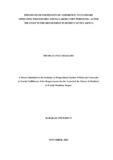PERCEIVED DETERMINANTS OF ADHERENCE TO STANDARD OPERATING PROCEDURES AMONG LABORATORY PERSONNEL AS PER THE STAFF IN THE DEPARTMENT IN BOMET COUNTY, KENYA
Abstract
Laboratory errors are a major burden in health care systems. To decrease laboratory error
and increase laboratory quality international health organizations such as the World
Health Organization developed laboratory quality management systems (QMS). One of
the QMS essentials (Documents and Records) contains Standard Operating Procedures
(SOPs). SOPs are step-by-step instructions that laboratory personnel use as a guide in
performing laboratory procedures. Thus, adhering to SOPs ensures consistency,
accuracy, and quality of laboratory procedures, thereby increasing laboratory data quality
and reducing errors. However, studies in Kenya have shown low percentage results in
evaluating documents and records, which means low adherence to SOPs. This study
aimed to identify the determinants of adherence to SOPs. A qualitative
phenomenological study was conducted in two conveniently selected hospitals (Tenwek
Mission Hospital and Longisa County Referral Hospital) in Bomet County, Kenya. Four
focused group discussions and eight key informant interviews were done. Based on the
objectives, collected data were analyzed using manual coding and thematic analysis. The
study identified themes that determine adherence to SOPs which mainly is the working
environment, factors that promote adherence to SOPs are professional education,
leadership factors, and work environment. Key areas that needed intervention on SOPs
adherence are personal reasons, professional education, and quality equipment.
Professional education and leadership have been suggested for the sustenance of
intervention. Recommendations to hospitals to increase opportunities for professional
education and to increase the number of staff to help lower workload are made
Collections
- Publications 2019 [91]

